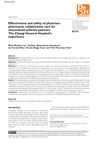 7 citations,
January 2010 in “Pharmacognosy Research”
7 citations,
January 2010 in “Pharmacognosy Research” The tobacco leaf extract may help hair grow and could treat hair loss.
 6 citations,
January 2023 in “npj regenerative medicine”
6 citations,
January 2023 in “npj regenerative medicine” Transplanting growing hair follicles into scars can help regenerate and improve scar tissue.
 6 citations,
December 2020 in “Dermatological reviews”
6 citations,
December 2020 in “Dermatological reviews” COVID-19 may worsen with androgens; anti-androgen drugs could help.
 5 citations,
June 2022 in “Frontiers in veterinary science”
5 citations,
June 2022 in “Frontiers in veterinary science” Improving how drugs are absorbed through the skin could better treat mange in wombats.
 5 citations,
January 2021 in “Biomedicine & Pharmacotherapy”
5 citations,
January 2021 in “Biomedicine & Pharmacotherapy” Policosanol helps treat hair loss by balancing hormones and supporting hair growth.
 4 citations,
July 2020 in “Journal of Dermatological Treatment”
4 citations,
July 2020 in “Journal of Dermatological Treatment” Minoxidil injections can speed up hair regrowth in non-severe patchy hair loss, but combining it with steroids doesn't improve results.
 2 citations,
April 2019 in “Proceedings of Singapore Healthcare”
2 citations,
April 2019 in “Proceedings of Singapore Healthcare” Collaborative care between physicians and pharmacists improved medication management for rheumatoid arthritis without raising costs.
 2 citations,
April 2019 in “Experimental Dermatology”
2 citations,
April 2019 in “Experimental Dermatology” The article concludes that studying how skin forms is key to understanding skin diseases and improving regenerative medicine.
 2 citations,
October 2017 in “Revista Da Associacao Medica Brasileira”
2 citations,
October 2017 in “Revista Da Associacao Medica Brasileira” Removing p16INK4a from skin cells can lead to faster and more clumped growth, which might help with hair growth.
 2 citations,
November 2015 in “Actas Dermo-Sifiliográficas”
2 citations,
November 2015 in “Actas Dermo-Sifiliográficas” Epidermal stem cells show promise for future dermatology treatments due to ongoing advancements.
 February 2024 in “Scientific reports”
February 2024 in “Scientific reports” Four genes are potential markers for hair loss condition alopecia areata, linked to a specific type of cell death.
 January 2024 in “Hypertension research”
January 2024 in “Hypertension research” More research is needed to understand sex and racial differences in long COVID.
 January 2024 in “Biological trace element research”
January 2024 in “Biological trace element research” Isotretinoin affects trace element levels and requires monitoring of liver and kidney functions.
 October 2023 in “International journal of biology, pharmacy and allied sciences”
October 2023 in “International journal of biology, pharmacy and allied sciences” Personalized treatment plans combining natural and synthetic approaches are important for managing alopecia effectively.
 June 2023 in “Research Square (Research Square)”
June 2023 in “Research Square (Research Square)” Different immune responses cause hair loss in scalp diseases, with unique patterns in scalp psoriasis possibly protecting against hair loss.
 June 2020 in “The journal of investigative dermatology/Journal of investigative dermatology”
June 2020 in “The journal of investigative dermatology/Journal of investigative dermatology” Topical treatments led to hair regrowth in a man with linear morphea.

The document concludes that diagnosing female hair loss requires careful examination, with treatments varying by condition and psychological support often necessary.

The conclusion is that a more comprehensive and precise approach is needed for diagnosing PCOS to address its broader health risks.
 December 2016 in “British Journal of Dermatology”
December 2016 in “British Journal of Dermatology” The meeting highlighted the importance of genetic testing and multidisciplinary approaches in pediatric dermatology.
 September 2016 in “Springer eBooks”
September 2016 in “Springer eBooks” Fat-derived stem cells may help treat skin aging and hair loss.
 April 2016 in “Medical Acupuncture”
April 2016 in “Medical Acupuncture” The document concludes that hair loss in women is treated with medications, therapies, and surgery in Western medicine, and with acupuncture and herbs in Chinese medicine, but hereditary hair loss is hard to reverse.
 June 2007 in “Endocrinology and Metabolism Clinics of North America”
June 2007 in “Endocrinology and Metabolism Clinics of North America” The document covers various male health issues, their causes, treatments, and related conditions.
 July 2002 in “Australasian Journal of Dermatology”
July 2002 in “Australasian Journal of Dermatology” Maintaining anticoagulation is crucial for patients with antiphospholipid syndrome.
 July 2002 in “Australasian Journal of Dermatology”
July 2002 in “Australasian Journal of Dermatology” A woman with lupus had hair loss and skin issues that were successfully treated with medications.
 May 2021 in “Experimental Cell Research”
May 2021 in “Experimental Cell Research” FOXC1 boosts SFRP1 in hair loss, suggesting new treatments.
 September 1997 in “Journal of The European Academy of Dermatology and Venereology”
September 1997 in “Journal of The European Academy of Dermatology and Venereology” New treatment improves male hair loss.
 1160 citations,
November 2018 in “Physiological Reviews”
1160 citations,
November 2018 in “Physiological Reviews” The document concludes that better targeted treatments are needed for wound healing, and single-cell technologies may improve cell-based therapies.
 164 citations,
January 2014 in “Journal of Cutaneous and Aesthetic Surgery”
164 citations,
January 2014 in “Journal of Cutaneous and Aesthetic Surgery” PRP injections increase hair density and satisfaction in androgenetic alopecia patients.
 135 citations,
December 2015 in “Expert Opinion on Biological Therapy”
135 citations,
December 2015 in “Expert Opinion on Biological Therapy” Exosomes could potentially enhance tissue repair and regeneration with lower rejection risk and easier production than live cell therapies.
 96 citations,
February 2007 in “The Journal of Clinical Endocrinology & Metabolism”
96 citations,
February 2007 in “The Journal of Clinical Endocrinology & Metabolism” Women with type 1 diabetes often have polycystic ovary syndrome and excess male hormones, which are frequently undiagnosed.






























